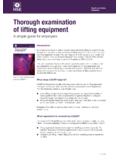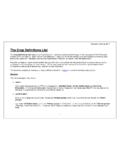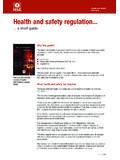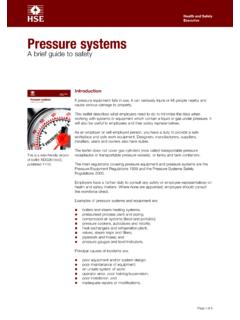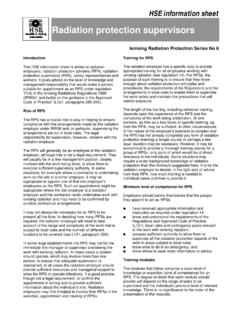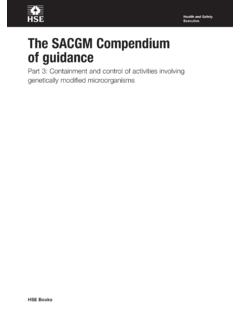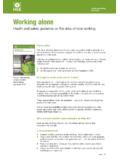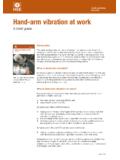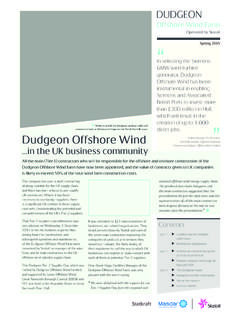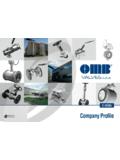Transcription of Planning to do business in the UK offshore oil and …
1 Planning to do business in the UK offshore oil and gas industry ? What you should know about health and safety Introduction The UK offshore oil and gas industry is constantly changing. It is a mature industry , but UK waters are thought to hold oil and gas reserves equal to those extracted since 1973. Innovation and new technology are keys to successful future exploitation. Although accident rates have improved significantly since the Piper Alpha disaster in 1988 the industry remains a hazardous place to work. HSE's regulatory role contributes to the sustainability of the industry . HSE's offshore Division (OSD) is responsible for enforcing health and safety law on offshore installations and for activities in connection with them.
2 OSD Inspectors can be approached for advice and guidance on how to comply. The law applies to operators, owners, employers, licensees, contractors, suppliers, directors and employees. You can contact an inspector through these HSE offices covering operations in the sectors of UK waters indicated: Getting started Companies Planning to operate in UK waters should contact the appropriate HSE office at the earliest possible stage. If you do not have a specific location in mind you can contact the Aberdeen based Legal and Operational Strategy team for advice. Apart from submitting a safety case in certain circumstances (see below) you do not generally need HSE's consent to start operations; however you may need to notify HSE, eg for well operations.
3 HSE can advise on the health and safety compliance issues to be addressed before start-up. What do companies need to do to comply with health and safety law? The health, safety and welfare of all personnel on offshore installations is protected by law. UK health and safety law follows a goal-setting approach. Instead of a prescribed checklist of things to do, which may not be right for all circumstances, goal-setting law sets out the objectives to be achieved. Duty holders must: systematically identify hazards;. assess the risks and the consequences of those hazards being realised; and put in place suitable procedures and measures to control the risks. 1 of 6 pages Goal-setting law allows duty holders to choose the most appropriate methods or equipment available to meet the legal requirements.
4 industry or HSE guidance is available describing good practice in meeting the law. Who is a duty holder? UK health and safety law places duties on a variety of people. Primary responsibilities are placed on those who create and/or have the greatest control of the risks associated with a particular activity. Those who create the risks at the workplace are responsible for controlling them. The Health and Safety at Work etc Act 1974 and its associated regulations mainly place duties on employers. offshore , this includes installation owners and operators and contractors. Employees also have duties under the Act. Everyone has a part to play in ensuring healthy and safe conditions at work.
5 However, in the four sets of specifically offshore -sector regulations below, responsibility is mainly placed on the primary duty holders, ie operators of production installations and owners of non-production installations. They are in overall control of the installation and must co-ordinate the health and safety activities of all the companies and personnel present. offshore Safety Regulations The offshore Installations (Safety Case) Regulations 2005 (SCR05) require all offshore installations to have a safety case accepted in writing by HSE. before they start operating in UK waters. Those parts of an installation that are identified as critical for the safety of the installation must be verified as suitable by independent and competent people.
6 Preparing a safety case is not usually a difficult task. It requires operators/owners to describe management systems and show a systematic and structured approach to managing the major hazards on the installation. Those who have done so find it provides valuable insights into their operations. HSE Inspectors can help people through the process. A safety case is the means by which a duty holder shows that: their management system is adequate to ensure compliance with the relevant statutory provisions. their management system ensures the satisfactory management of arrangements with contractors and sub- contractors. they have established adequate arrangements for audit and the making of reports thereof.
7 All hazards with the potential to cause a major accident have been identified and evaluated; and all major accident risks have been evaluated and measures have been, or will be, taken to control those risks to ensure that the relevant statutory provisions will be complied with. The offshore Installations and Pipeline Works (Management and Administration) Regulations 1995 (MAR) set out requirements for the safe management and administration of an offshore installation, such as the use of permit to work systems. Operators/owners are required, for example to: appoint a competent manager to be in charge of the installation; and ensure the safety of the helideck and helideck operations and appoint a competent person to control all helideck operations.
8 2 of 6 pages The offshore Installations (Prevention of Fire and Explosion, and Emergency Response) Regulations 1995 (PFEER) provide for the protection of people from fire and explosion, and for securing effective emergency response. Operators/owners are required, for example to: take measures to prevent fires and explosions and provide protection from any which do occur; and provide effective emergency response arrangements. The offshore Installations and Wells (Design and Construction, etc). Regulations 1996 (DCR) are aimed at ensuring the integrity of installations, the safety of offshore and onshore wells, and the safety of the workplace environment offshore .
9 Operators/owners are required, for example to: ensure the installation is structurally sound, stable and, if necessary, buoyant. provide, maintain and keep clean accommodation, washing and toilet facilities; and ensure workplaces are, clean, well ventilated, of a reasonable temperature and not overcrowded. Other law Other regulations under the Health and Safety at Work etc Act 1974 apply both onshore and offshore . They address hazards common to all industries, for example: manual handling;. working at height;. electrical equipment;. noise and radiation;. hazardous substances; and use of work equipment. These include regulations that implement European Union Directives.
10 Operators/owners are also required on each installation to: provide competent medics and first-aiders equipped with suitable medical and first-aid facilities; and provide for the election of safety representatives and the formation of a safety committee. Other regulations deal specifically with diving and pipelines. Both require certain operations to be notified to HSE. For further information on diving offshore , see: For further information on pipelines, see: Contractors On an offshore installation the operator or owner will set policy and provide the main resources for health and safety, but other employers may have people working for them on the installation.
